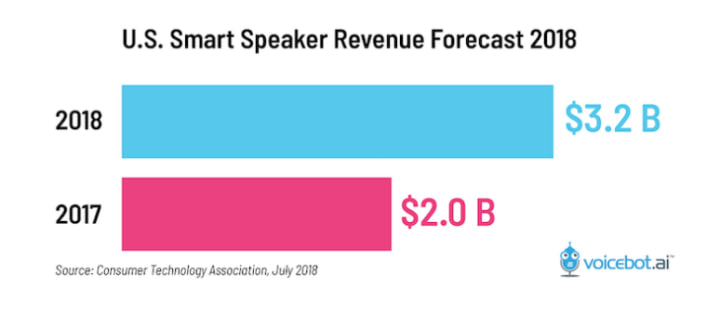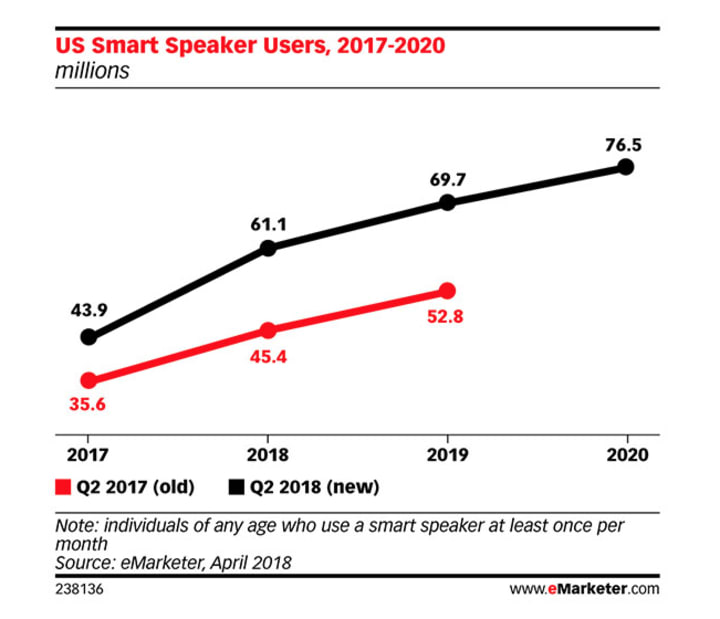Part 1: Alexa, Buy Me... Anything!
Smart speakers are a fast-rising, exciting new technology. However, the big question for marketers is when—and if—consumers will really start using them to order all our "stuff."

If I had told you even a decade or two ago that you could do some of the things with technology that we routinely do today when it comes to shopping, you would have laughed or thrown me out of the room. This would have been just as true whether I had been presenting a "2019 Tech Forecast" in 1999, or even in 2009, as a management consultant to the leadership of a company or whether it was sharing my predictions with a group of friends at a local watering hole! I would have seen some tech believers nod in agreement, but likely there would be more rolling of eyes and fidgeting in chairs from folks wondering when happy hour started.
20 or even 10 years ago, who would have believed that the phone would become the most common way we shop for everything today? Who would have believed that you could order anything (anything) online and have it delivered to your door in just a few days, or maybe even the same day? Who would have believed that you could shop for your biggest purchases and biggest investments—a car, a home, a mortgage—while sitting on your sofa in your pajamas? Who would have believed that you could shop for anything ever created on video (like ever) and either watch it for free immediately or be able to purchase it and view that TV show, that movie, that whatever... instantly?
Yep, sometimes we just take the revolutions—the multiple, ongoing, and ever-evolving revolutions—in our consumer lives for granted as they may take a while to take hold. However, once the change reaches a certain tipping point, we just suddenly, almost instinctively as a collective society know that this is the way things are and the way they will be moving forward. And there is no turning back. Think about it, in just a matter of a few short decades (really only two) we've moved from shopping in a world of "brick and mortar" only commerce, to e-commerce with shopping online, to m-commerce where shopping takes place in the palm of your hand.
And now there is a new term on the horizon: V-commerce. Now, lest you think this might stand for something pornographic—and of course, that's a whole other story of how online technology is transforming a business—we increasingly see and hear the term v-commerce emerging into use in white papers and in the media. What is v-commerce then? Well, why don't you ask Alexa... she will tell you!
V-commerce, as you may have guessed by now, is the new category of online shopping "voice commerce" that is driven by the smart speaker. Unless you have been living in a cabin far, far out in the woods without internet—and so, without any use for a smart speaker—the devices have become the new darling of much of the tech world. And for good reason. According to the most recent estimates from the Consumer Technology Association (CTA), smart speaker sales in the US alone are expected to have reached over three billion dollars in 2018 and fast approaching 40 million units sold in just the past year!


Driven by industry giants such as Amazon with its Echo line, Google with its Google Home smart speakers, and most recently joined by Apple with its HomePod, of all of today's "it" technologies, the Consumer Technology Association has forecast that smart speakers will see a higher growth rate than other "cool" emerging tech. This includes such much-buzzed about tech including:
- 4K TVs,
- Wearables (including Apple Watches and Fitbits),
- VR technology, and
- Drones.

Statista: "How Big Are the 'Next Big Things' in Tech?" (September 2018)
In fact, 10 of the top 10 selling smart speakers in the US—that would be 100% folks!—are marketed by just these three tech giants. And that market will be hard for startups and other wannabe competitors to crack, as according to the research firm Strategy Analytics, Amazon and Google together control approximately three-quarters of the American market at present! As the chart below shows, for once, Apple is a late entrant to this "tech party," with its HomePod presently capturing just 4 percent of US sales by market share, with the dreaded "others" category collectively capturing less than 20 percent of the total market.

Statista: "Amazon's Alexa Rules American Smart Homes" (November 2018)
The growth in actual smart speaker usage is growing at a dramatic rate, not just in the US, but globally. The latest estimates from eMarketer show that this year, almost 70 million Americans will be both listening to and talking with a smart speaker of some kind. Worldwide already, the research firm Canalysestimates that there are some 100 million smart speakers in use, and by 2022, this number will jump to approximately 300 million! And so truly, we are at the early stages of nothing less than a voice-driven tech revolution, with a burgeoning global market for these devices and companies—and consumers—exploring all different ways that they can put voice technology to work.

eMarketer: "Voice Commerce’s Growing Pains" (December 2018)

Canalys: "Smart Speaker Installed Base to Hit 100 Million by End of 2018" (July 2018)
Now, one can use these devices for all sorts of things. As demonstrated by the video below, whether it is Alexa, Google Home, or a HomePod, a smart speaker can be used in place of many other devices, both in the home and increasingly at work (and the work-side productivity—and comfort—aspects of this tech are really going to be interesting to explore in the coming years). With the potential ability to use smart speakers for applications ranging from senior care to medical monitoring to a thousand other applications—and innovative people around the world will be constantly finding even more ways to do so—the potential for smart speakers to be integrated into our lives, and increasingly with other "smart" devices, really is limitless.
Of course, Amazon, Google and Apple hope that one of the top uses of their smart speakers will be for shopping. This is why the projections for the growth of v-commerce are literally charts that go off the charts! With the ease of use that these devices provide consumers to buy anything just by voicing their wish with their smart speaker, many marketing folks simply salivate at the prospects that this technology provides to companies going forward.
So far though, much of the publicity surrounding so called smart speaker shopping has not been all that flattering. As the first video shows, there are inherent limitations to shopping without a screen, and companies like Amazon may need to refine their search and buying processes to "fit" voice shoppers as opposed to those who are shopping on a "traditional" device with the ability to see, compare and read about/research products.
And then again, you know that the way our social media world works, and that means that the epic fails of voice shopping will go viral—quickly. Even in the early stages of this tech's lifespan, we already have examples of the family pet parrot who orders "stuff" from Alexa...
... kids "accidentally" ordering what they want to play with on Alexa, and on their parents Prime account of course...
... and kids having way, way too much fun making a shopping list with funny words (or at least words that kids find hilarious) on their parents Alexa!
All of this leads to a very interesting question, one that literally is a billion, really multi- and tens of billions of dollars question—and that is just how interested are consumers in using smart speakers to order our "stuff." Some of the early research in this area should be of significant concern to both tech firms and retailers, which, of course, when you are talking about the market leaders in this space to date—namely Amazon, Google, and Apple—are one and the same.
As you can see from the two charts from eMarketer below, voice buying is something that smart speaker users have not begun to use regularly to date—and the projected growth rate of the percentage of smart speaker owners who are willing to use these devices for shopping is not forecast to grow in any meaningful way, at least through 2020. Furthermore, the actual utilization of smart speakers may be even lower than public projections. According to research conducted by the tech publisher, The Information, perhaps as few as 2 percent of current Alexa owners having bought anything through their device—with little repeat purchase behavior. So, while we have very optimistic projections for smart speakers to be increasingly found in American homes, and indeed those around the globe, there are also some troubling estimates on actual utilization that could spell trouble—perhaps big trouble—for the growth of v-commerce overall.

eMarketer: "How Interested Are US Internet Users in Making Purchases Using Smart Speakers?" (December 2018)

eMarketer: "Few People Regularly Make Purchases Through Smart Speakers" (December 2018)
And so, the second part of this article will specifically address several of the challenges and opportunities ahead for the growth of v-commerce. I will encourage you to follow me and my work in this area, as I do feel confident, overall, as a strategic management consultant and professor, that smart speakers and voice commerce will indeed be one of the real drivers of a whole new world of retail as we move toward 2020 and beyond.
Connect with the Author
Want to learn more about the work of Professor David C. Wyld? Want to work with him for your company’s benefit? Connect with him here.
About the Creator
David Wyld
Professor, Consultant, Doer. Founder/Publisher of The IDEA Publishing (http://www.theideapublishing.com/) & Modern Business Press (http://www.modernbusinesspress.com)






Comments
There are no comments for this story
Be the first to respond and start the conversation.